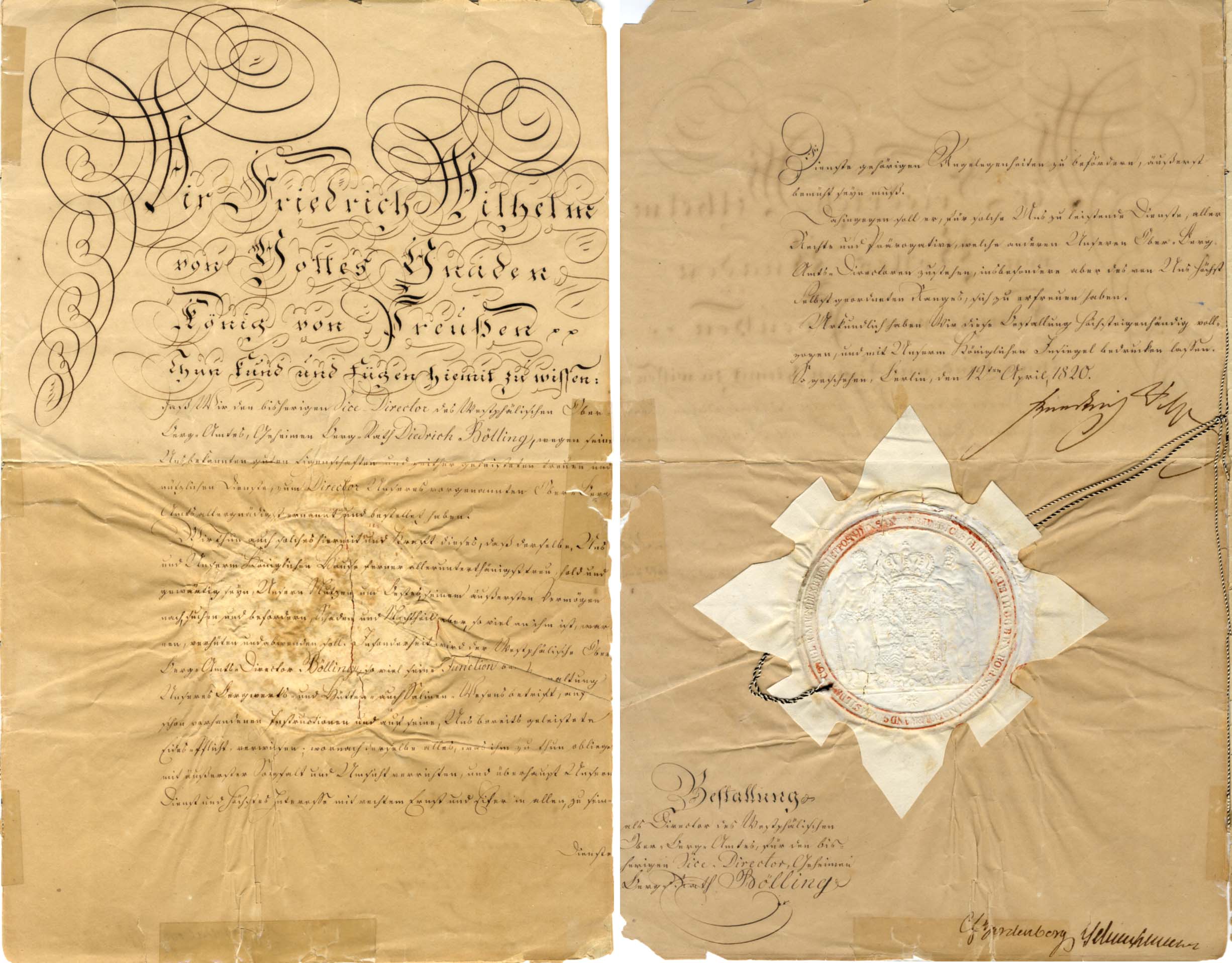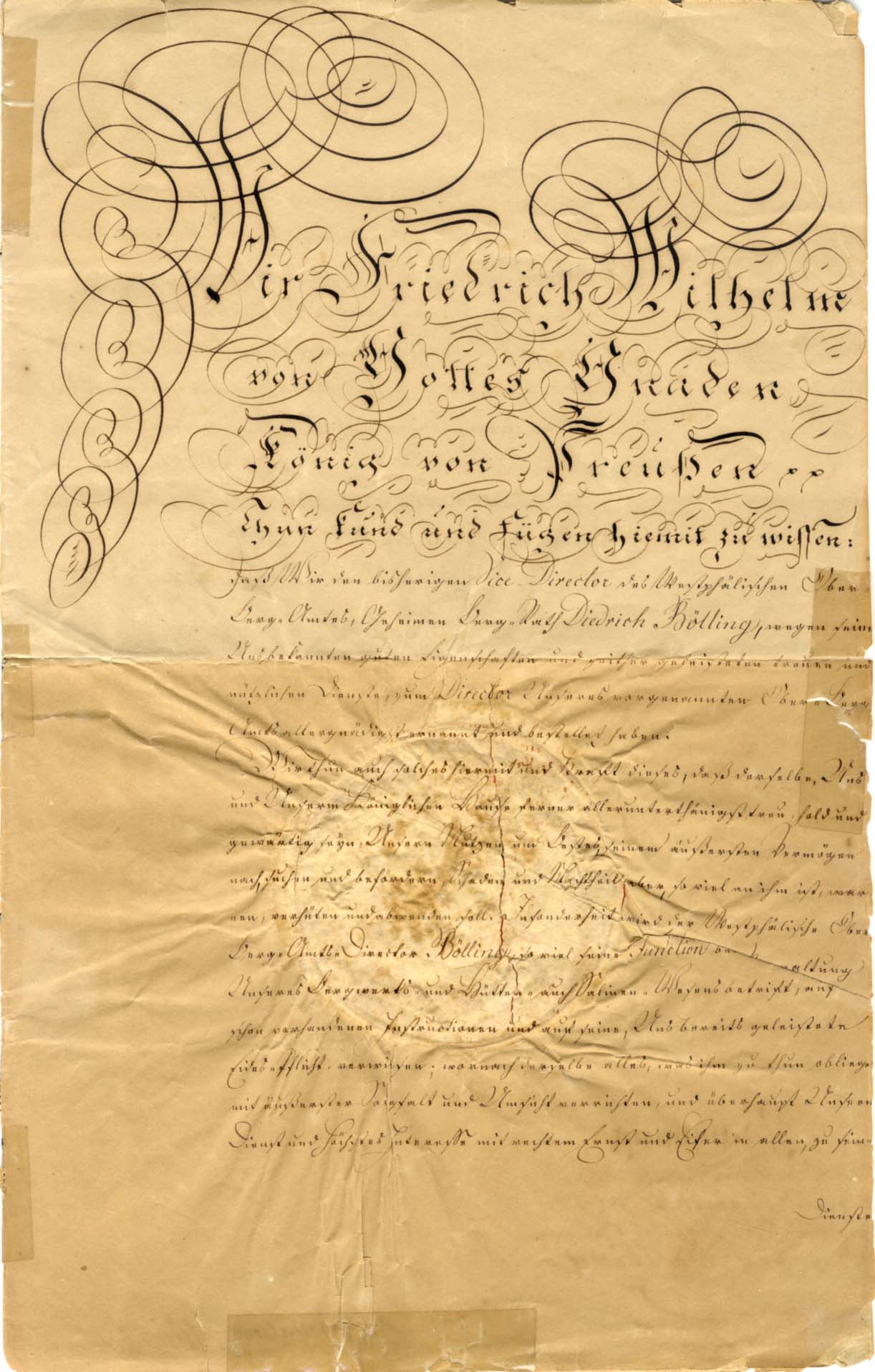描述
Document signed, two pages (both sides) - with paper seal, 8 x 12,75 inch, Berlin, 12.04.1820, in old German, appointment of the previous deputy director Dietrich Bölling as director, signed in black ink "Friedrich Wil", with browning, creasing, a horizontal letter fold, a few tears (partly repaired with tape), and chipping to the edges - in good condition.
"Wir Friedrich Wilhelm,
von Gottes Gnaden König von Preußen [etc. etc.]
bisherigen Vice-Director [...] zum Director [...]. Berlin, den 12ten April 1820.
Friedrich Wil."
Translated:
"We Friedrich Wilhelm,
by the Grace of God King of Prussia etc. etc.
the previous deputy director [...] as director [...]. Berlin, April 12, 1820.
Friedrich Wil."
有关该人的更多信息
Profession:
(1770-1840) King of Prussia from 1797 to 1840 - he ruled Prussia during the difficult times of the Napoleonic Wars and the end of the Holy Roman Empire.
Year of Birth: 1770
Frederick William III was the King of Prussia from 1797 until his death in 1840. He was the son of Frederick William II and Louise of Mecklenburg-Strelitz, and the grandson of Frederick the Great. He was a military reformer, and adopted the Prussian military reforms of his grandfather. He was also an enlightened ruler, who sought to improve the lives of his subjects.
Frederick William III ascended to the throne of Prussia in 1797, succeeding his father. He initially followed the policies of his father, but soon began to implement military reforms which had been suggested by his grandfather, Frederick the Great. He began to modernize the Prussian army, introducing new tactics and weapons, and replacing outdated equipment. He also created a new system of military academies, which allowed for a more efficient and professional military force.
Frederick William III was also an enlightened ruler, and he sought to improve the lives of his subjects. He abolished serfdom, and granted freedom of religion. He also introduced a number of social reforms, such as the establishment of a welfare system, public education, and the abolition of capital punishment. He was also a patron of the arts, and commissioned many works of art and architecture.
Frederick William III also sought to expand the influence of Prussia abroad. He joined with Britain and Russia to form the Third Coalition against Napoleon, and fought in several battles against the French. He was eventually defeated by Napoleon, and Prussia was forced to cede some of its territory to France. Despite his defeat, Frederick William III gained recognition as a great warrior and diplomat, and he is often remembered as one of Prussia's greatest rulers.
Frederick William III died in 1840, and was succeeded by his son, Frederick William IV. He was remembered as a great ruler, and his reforms are still remembered today. He is also remembered for his military reforms, which helped to modernize the Prussian army and make it one of the most formidable forces in Europe.
Frederick William III is remembered as one of Prussia's greatest rulers, and his reforms still have an effect on modern Germany. He was an enlightened ruler, who sought to improve his people's lives, and a great military leader, whose reforms helped to make Prussia a major power in Europe. He is remembered as a great patron of the arts, and a great diplomat, whose legacy still lives on today.
真实性证书
我们所有的作品均以真实性证书出售。如果一件作品错误或不喜欢亲笔签名,那么您一生就会拿回钱。
付款和安全
您的付款信息已安全处理。我们无法存储信用卡详细信息,也无法访问您的信用卡信息。



